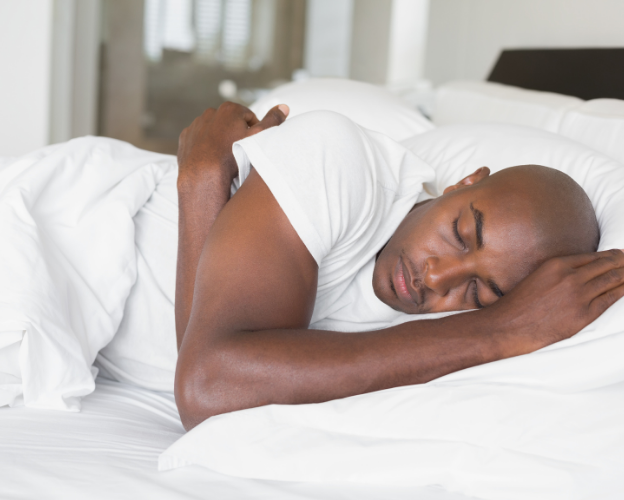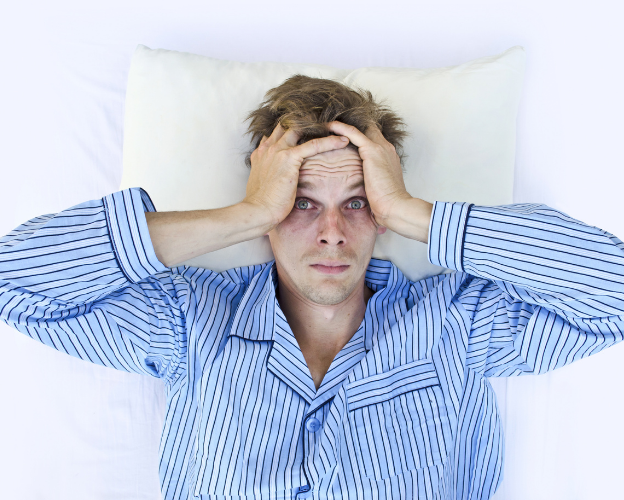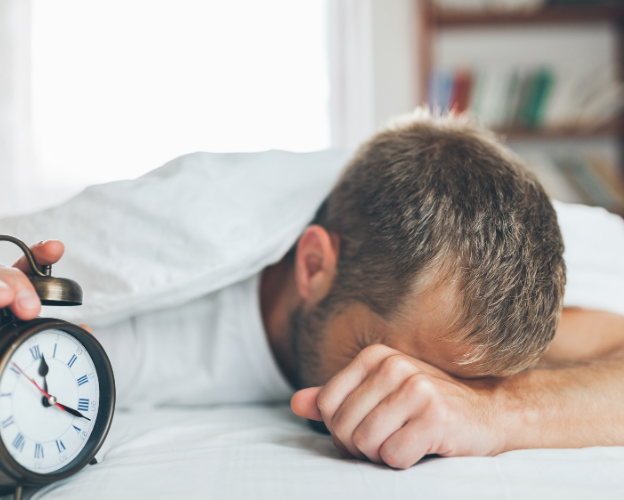How Much Sleep Do You Actually Need?

How Sleep Deprived Are You?
There are two primary categories of sleep loss in the research. Sleep restriction refers to a partial disturbance of their normal sleep-wake cycle. Think Tuesday after the Superbowl. This is the milder category of sleep loss.
Sleep deprivation, meanwhile, refers to extreme cases of sleep loss, where both quality and quantity are significantly affected. (First few weeks after a child is born).
It is important to understand the duration of sleep deprivation as it will impact the time it takes to recover and normalize your sleep. Unfortunately, we cannot bank our sleep, and sleeping in late on a random Saturday will not erase chronic sleep debt. All of the impacts of sleep I am about to cover typically occur in a state of sleep deprivation. Sleep restriction may lead to some changes as well, but they are typically milder and can be quickly reversed with a good night of sleep or some coffee.
Sleep Influences Our Hormones
When hormones are mentioned, people often think of emotions, but hormones control many functions in our bodies. Hormones are responsible for building muscle (testosterone), controlling our blood sugar (insulin), healing (cortisol), and feelings of hunger (leptin). All of these hormones, and many more, are influenced by sleep.
Have you ever noticed an increased desire to snack when you are hungry? Your leptin levels — the hormone that tells your brain you are full — are lowest when you are sleep deprived. This causes you to crave more food. The desire for snacking intensifies when we are tired.
Our cortisol levels increase when we are in a state of sleep debt. While cortisol – the stress hormones – is necessary for healing, excessive levels can be harmful.
Our insulin sensitivity and glucose tolerance decrease when we are sleep deprived. Essentially, we are more susceptible to blood sugar spikes. This is bad for our bodies.
As you can see, our sleep duration and quality can significantly impact the effectiveness of dietary interventions. I’m only getting started.

Sleep is Needed to Build Muscle and Lose Fat
Losing weight and building muscle are both challenging. They require disciplined eating and exercise. Looking for an added challenge? Throw in sleep deprivation and you will be hard-pressed to achieve desired results.
Scales can be deceiving. Dropped pounds does not always mean fat loss. A study looked at the influence of sleep on the type of weight we lose. It took two matched groups of people and controlled their diet and exercise. They all completed the same exercise plan while cutting their daily calories by 10%. The difference was the amount of sleep they received: 8.5 versus 5.5 hours. At the end of the study, each group lost the same amount of weight, but where they lost the weight differed. The weight the people in the 8.5 hours group lost was 50% fat and 50% muscle. For the 5.5 hour group, the weight lost was 20% fat and 80% muscle.
The amount of sleep we receive changes how our metabolism works. Similarly, research shows it is more challenging to build muscle when we are sleep deprived. During deep sleep, our body uses fat stores for energy and stimulates muscle growth. Sleep deprivation causes the reverse. We break down muscle for energy and leave the fat stores alone.
The scale will say your diet is working, but the mirror will be less kind if you are lacking sleep.
Sleep is Needed for Performance
Sleep can be broken down into five stages and each serves a specific function. For example, we build memories during slow wave sleep, including motor memory. Sleep is not only necessary for remembering information, but for improving movement skills such as your golf swing or playing the piano. The amount of sleep deprivation matters.
A single night of poor sleep will not cause your muscle to deteriorate or your skills to vanish. Research suggests, however, sport-specific skill execution, submaximal strength, and muscular power decline with short-term sleep restriction.
Fewer than seven hours of sleep can impair alertness, reaction time, memory, and decision making. Research shows sleep restriction causes heightened levels of sleepiness, depression, confusion, and poorer overall mood states as well. When sleep deprivation becomes chronic, athletic performance suffers greatly and it becomes more difficult for athletes to recover.
Greater total sleep loss results in poorer overall mood states, increased fatigue, sleepiness, and confusion, decreased vigor and liveliness, heightened depression, and decreases in logical reasoning and decision making. The speed and accuracy of cognitive, auditory, and memory tasks all suffer. Sleep deprivation will dramatically worsen our effectiveness at our jobs, school, and training.
So, in summary, when we in sleep debt, we struggle to recover and heal, our thoughts and memories significantly decline, our metabolism suffers, and we are hungrier. The solution is simple: sleep more. But how much sleep is enough?
How Many Hours Should We Sleep?
There is no universal threshold for ideal sleep duration. Research shows the typical accepted range for adults is 7–9 hours, for adolescents 8–10 hours, and for young children 10–12 hours. Sleep duration varies depending on genetics, age, and stressors, such as your activity level, job demands, and stress levels. The best way to know how much sleep you need is to allow your body to wake up on its own. Yes, I mean without an alarm clock. An alarm clock should serve as a backup. Ideally, your circadian rhythm and routine will lead you to wake around the same time every day.
Our bodies are finely tuned, complex machines that know when they receive optimal sleep. Here comes the uncomfortable recommendation. If you wake up 20 minutes before your alarm goes off, that does not mean say a quick prayer of thanks and close your eyes for 20 more glorious minutes; it means to get out of bed. The snooze button is not your friend. You are better off establishing a routine by going to bed and waking at the same time every day.

The true value of sleep comes from achieving deep slow-wave sleep and moving through the cycles sequentially. Remember, each stage serves a purpose. The extra 20 minutes are not truly helping and can impair your normal timing. Instead, set the alarm for when you absolutely must be out of bed by. If you wake sooner, then you are likely more well-rested (your body made the decision) and you have more time on your hands. Win-Win.
One final note on sleep duration, you cannot make up for sleep debt with one solid night of sleep. According to research, if you are in chronic sleep debt, it takes up to nine consecutive days of adequate quality and duration of sleep to recover.
Sleep Quality is Vital
I have primarily focused on quantity but it is only half the equation. Without quality sleep, you will still be sleep deprived. Simply lying in bed for 8 hours does not mean you received 8 hours of sleep. If you are tossing and turning all night, wake multiple times, or lie in bed for longer than 30 minutes before falling asleep, the quality is not great. You feel this when you wake in the morning.
You know you are achieving adequate duration and quality of sleep when you wake without fatigue or the immediate desire for a gallon of coffee. So how do we achieve high-quality sleep?
There are many anecdotal answers to the question (type of mattress, number of pillows, etc.) but also many research-backed recommendations. One of the primary needs is a dark room. Light triggers the timing of our sleep-wake cycle through melatonin release.
Next, limit noise distractions. If you can’t sleep without noise, opt for “white noise” through either a sound machine or a fan. You want something consistent and in the background. TV, music, and audiobooks don’t count as they increase brain activity. Research shows even small levels of cognitive function and awareness challenges your ability to fall stay asleep. You must also consider the hours leading up to bedtime.
Avoid blue light – light from electronics – as it affects your circadian rhythm and timing of melatonin release. This means no computer, phone, or TV screens at least an hour prior to bed. Avoid caffeine at least 6 hours before bed. Avoid sleep aids (unless specifically prescribed by a physician, this article is not intended to provide medical advice) and alcohol prior to bed as these impair sleep quality. While they may assist with falling asleep, research shows they can alter our sleep cycles and impede our ability to achieve deep slow-wave sleep, however, some new drugs are attempting to improve slow-wave sleep. If consuming alcohol at night, it is best to have a moderate amount (e.g. 1 glass of red wine) with a meal as alcohol prior to sleep is associated with poor quality.
Speaking of meals, avoid food consumption at least an hour prior to bed and avoid midnight snacks. This last recommendation may cause you to pause and question the validity of this entire article. True, going to bed hungry can be miserable and at times seem impossible but the research is clear we are better off sleeping a few hours after eating. There are several issues with a meal immediately before bed going to bed:
-
Our insulin sensitivity plummets prior to sleep and during sleep (without getting into too much detail, this is a primary reason why midnight snacking is on the ‘do not do’ list) leading to increased fat storage.
-
Our body will be focused on digestion which can disturb our sleep quality.
-
Meal timing can impact our circadian rhythm.
Building a Sleep Plan

This an exhaustive list of the methods to positively influence sleep. Some readers may vehemently challenge a few of the listed strategies. A couple of notes on this.
Sleep research lacks the same robustness as other medical fields. There is conflicting evidence and we do not have a perfect understanding of sleep. Also, sleep is impacted by many individual variables such as genetics, stress, and demands of daily life. Some of the recommendations are unrealistic – night shift worker, a parent with kids who think sleep is more of a suggestion than a rule, living next to people who love randomly shooting off fireworks throughout the year – and have led to individual adaptations. Lastly, we often value personal experience over research.
Bear in mind that “getting by” is not the same as optimal. Obtaining eight hours of sleep will come at a cost. It is up to you whether the added time dedicated to preparing for and obtaining optimal sleep is worth it.
Sleep is often overlooked and often the missing link to health, performance, and recovery. These recommendations will not yield immediate results. Like many aspects of health, it requires consistency to adapt. Determination is not enough. The added hours obtained by skipping sleep do not make up for the decrease in performance.
Sleeping may feel like a waste of time, but obtaining adequate sleep will greatly improve your effectiveness and efficiency when awake. Talk to your physical therapist about sleep strategies and how optimal sleep can help you.
ABOUT THE AUTHOR

Zach Walston (PT, DPT, OCS) grew up in Northern Virginia and earned his Bachelor of Science in Human Nutrition, Foods, and Exercise at Virginia Polytechnic Institute and State University. He then received his Doctorate of Physical Therapy from Emory University before graduating from the PT Solutions’ Orthopaedic Residency Program in 2015.
Zach has numerous research publications in peer-reviewed rehabilitation and medical journals. He has developed and taught weekend continuing education courses in the areas of plan of care development, exercise prescription, pain science, and nutrition. He has presented full education sessions at APTA NEXT conference and ACRM, PTAG, and FOTO annual conferences multiple platforms sessions and posters at CSM.
Zach is an active member of the Orthopedic and Research sections of the American Physical Therapy Association and the Physical Therapy Association of Georgia. He currently serves on the APTA Science and Practice Affairs Committee and the PTAG Barney Poole Leadership Academy.